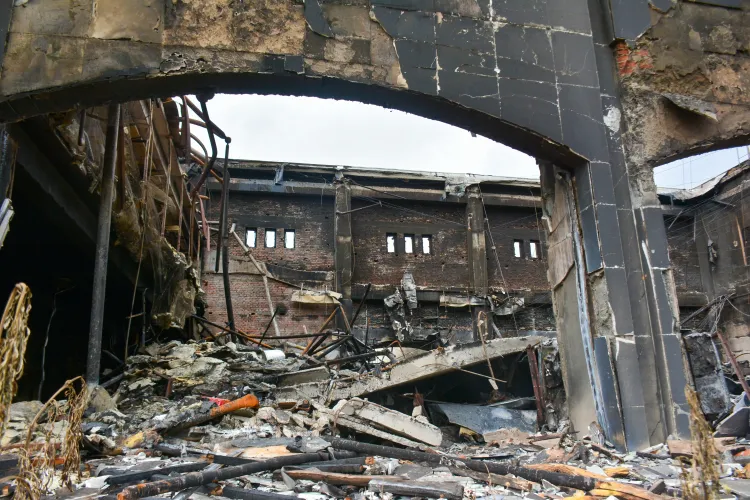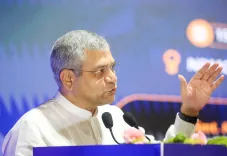What Impact Did the Gen-Z Protests Have on Nepal's Business Sector?

Synopsis
Key Takeaways
- Significant losses in Nepal’s private sector due to protests.
- Hilton hotel and Bhatbhateni Supermarket among the most affected businesses.
- Over NPR 25 billion in estimated damages across various sectors.
- Calls for recovery and rebuilding from the business community.
- Need for peaceful avenues to address political grievances.
Kathmandu, Sep 15 (NationPress) The destruction and fire that erupted during the Gen-Z protests last week, which led to the downfall of former Prime Minister K P Sharma Oli's government, has inflicted significant damage on the private sector in Nepal.
During the violent protests that commenced on September 8, numerous establishments including large shopping malls, hotels, factories, auto showrooms, and the residences of business owners were targeted, resulting in the deaths of 72 individuals and over 1000 injuries by Monday.
Among the severely impacted was Kathmandu's five-star Hilton hotel, which suffered extensive damage. The hotel had only opened its doors in July 2024, making its debut in Nepal.
Just over a year after starting operations, this towering hotel located in Naxal—merely four kilometers from Tribhuvan International Airport and close to prominent tourist spots like Thamel—was engulfed in flames by a mob during the anti-government protests on September 9.
Images of the glass structure ablaze circulated widely on social media, alongside visuals of other government buildings, businesses, and private properties.
The Hotel Association of Nepal (HAN), representing hotels nationwide, reported that the losses incurred from the burning of the Hilton hotel exceeded NPR 8 billion or INR 5 billion. The HAN estimated that the total losses from vandalism and arson against hotel properties during the protests reached approximately NPR 25 billion.
As per the HAN’s statement, more than a dozen hotels—both local and international—across the country sustained considerable damage as mobs wreaked havoc on properties in the Kathmandu Valley and other cities, including Pokhara, Butwal, Bhairahawa, Jhapa, Morang’s Biratnagar, Dhangadhi, Mahottari, and Dang’s Tulsipur on September 9.
The Hilton hotel appeared to be specifically targeted amid rumors suggesting a connection between Jaybir Deuba, son of former Prime Minister Sher Bahadur Deuba, and the hotel property. The Shankar Group, responsible for developing the hotel, denied these rumors.
Former Prime Minister Deuba’s residence was also vandalized and set ablaze, alongside properties belonging to several other leaders, including outgoing Prime Minister Oli, Pushpa Kamal Dahal, and Jhalanath Khanal.
In addition to Hilton, the largest retail chain in the Himalayan nation, Bhatbhateni Supermarket, was looted and incinerated by arsonists on September 9.
A total of 21 out of 27 of the supermarket's outlets were attacked, with 12 completely destroyed by fire. Tragically, 10 burnt bodies were discovered in two of the Bhatbhateni locations, long after the mobs had set them alight.
Min Bahadur Gururg, the owner of the supermarket chain, was believed to have had a 'close connection' with former PM Oli, which may have incited the assaults on Bhatbhateni. Last year, Gurung had announced plans to establish a modern office for the then-ruling Communist Party of Nepal (United Marxist Leninist) or CPN (UML).
Bhatbhateni’s Chief Operating Officer Panu Datta Poudel stated they were still compiling damage assessments for their properties. Despite the destruction, Bhatbhateni resumed operations at 16 of its outlets starting Sunday.
The Chaudhary Group (CG), led by Binod Chaudhary, a former lawmaker from the Nepali Congress in the now-dissolved House of Representatives, also faced tremendous losses amid the Gen-Z protests.
'We experienced acts of shocking cruelty: our chairman was directly targeted, family homes were attacked and burned, our factories and offices suffered damage, and our showrooms were looted,' CG's Managing Director Nirvana Chaudhary expressed on Facebook. 'Decades of hard work, sacrifice, and dedication turned to ashes in a matter of hours. This was not merely an assault on property but on hope, trust, and the very essence of creating something meaningful for our nation,' he added. Nirvana is Binod Chaudhary's eldest son, the only billionaire from Nepal on Forbes’ Billionaire List.
A senior official from the group, speaking anonymously, revealed that their electronics assembly factory and CG Net data center in Kathmandu were destroyed. Additionally, an auto showroom in Thapathali, Kathmandu, and the GG Landmark Mall in southern Chitwan were also vandalized.
The Kathmandu headquarters of the private telecom operator Ncell was likewise vandalized and partially burned, according to the company.
These businesses have turned to social media, expressing their determination to recover from the events of last week. However, the violence has severely undermined the confidence of the Nepali business community, which is already grappling with a lack of demand for goods and services due to low investment.








